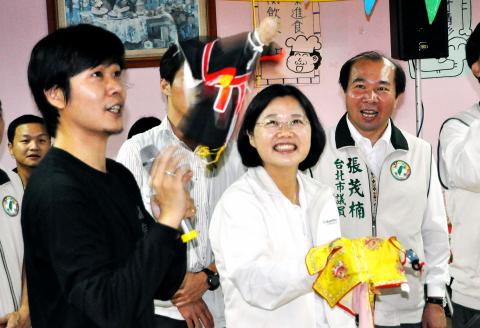|
2012 ELECTIONS: Ma’s
lead falls within margin of error
RAZOR-THIN: A futures market says the
president’s lead peaked at almost 19 percent last month, but then plummeted
after he floated signing a peace accord with China
By Rich Chang / Staff Reporter, with Staff Writer

Democratic Progressive Party
Chairperson Tsai Ing-wen, center, tries her hand at traditional puppetry
yesterday in Miaoli County under the guidance of Huang Wu-shan, left, head of
the Shan Puppet troupe. The latest opinion poll shows President Ma Ying-jeou
holding a slim lead over Tsai, but within the poll’s margin of error.
Photo: Taipei Times
President Ma Ying-jeou (馬英九) and
Democratic Progressive Party (DPP) Chairperson Tsai Ing-wen (蔡英文) are locked in
a tight presidential election race, with the latest media poll putting the lead
Ma holds over Tsai within the poll’s margin of error.
A poll result released by the -Chinese language China Times yesterday showed
that if only two pairs of presidential candidates were fielded, Ma and Premier
Wu Den-yih (吳敦義) on the Chinese Nationalist Party (KMT) ticket against Tsai and
DPP Secretary-General Su Jia-chyuan (蘇嘉全) on the DPP ticket, the support rate
for the Ma-Wu ticket would be 44.3 percent, while it would be 41 percent for the
Tsai-Su ticket.
Although the poll gave Ma a lead of 3.3 points over Tsai, it was the closest gap
between the two candidates in the presidential surveys that the China Times has
conducted in recent months.
If People First Party (PFP) presidential hopeful James Soong (宋楚瑜) were to
participate in the January presidential election along with his running mate,
academic Lin Ruey-hsiung (林瑞雄), the Ma-Wu ticket would garner 41.7 percent
support, while the Tsai-Su ticket would gain 38.2 percent and the Soong-Lin
ticket would receive 10.4 percent, the poll showed.
The poll questioned 1,074 people and had a margin of error of 3 percentage
points.
On Monday, xfuture.org, a Web site with a platform similar to the stock market
that allows users to predict the results of future events, said Tsai held a
slight lead over Ma in terms of her percentage of votes and her possibility of
getting elected.
As of Saturday, the exchange predicted that Tsai would receive 49.5 percent of
votes, Ma would get 48.3 percent and Soong would take 7.5 percent. Tsai has held
the lead in the past nine days, and in the past three days her margin has
exceeded 1 percentage point.
On the possibility of being elected, on Saturday the exchange gave Tsai 44.8
percent, Ma 41.5 percent and Soong 13.5 percent.
It said Ma’s chances of winning the election rose steadily from early September,
peaking on Oct. 16 when he was 18.7 percentage points ahead of Tsai. However,
that lead narrowed after Ma floated the possibility of signing a peace pact with
China within the next 10 years.
According to National Chengchi University’s Prediction Markets Center,
prediction markets efficiently collect effective information through a futures
or stock-trading mechanism that relies on the wisdom of the public, who buy and
sell contracts of future events on the market.
|
![]()
![]()
![]()